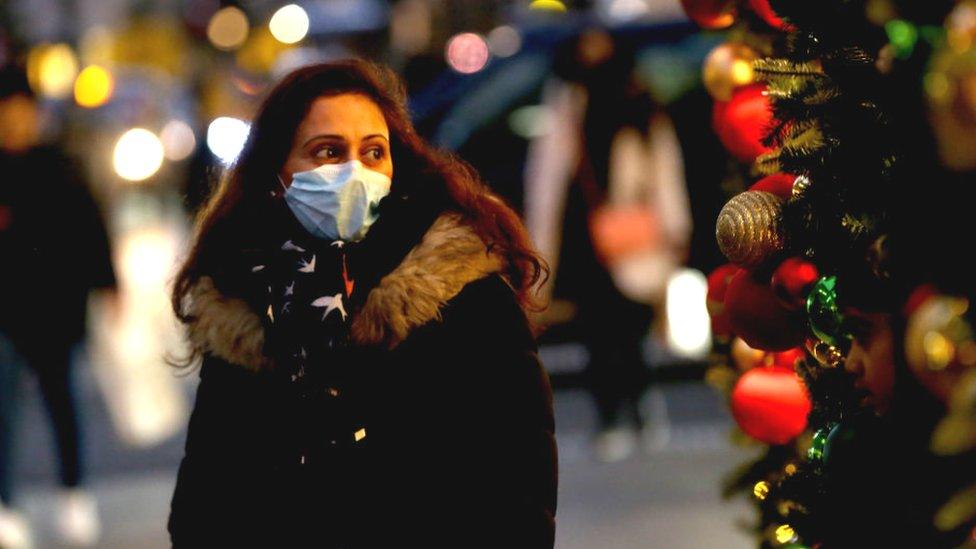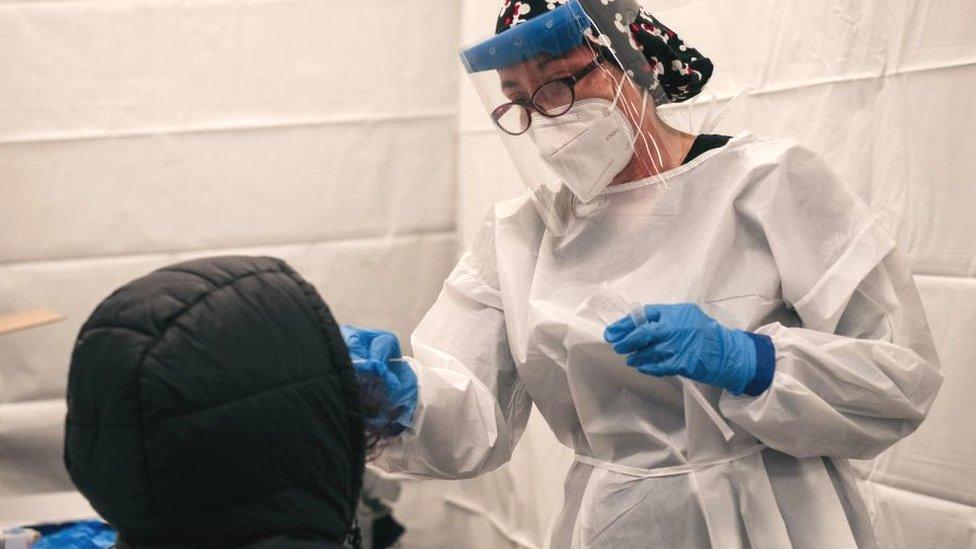Covid: Evidence does not support more England curbs - minister
- Published

The government will keep its decision not to impose further Covid curbs in England under very close review, a cabinet minister has said.
Environment Secretary George Eustice said the evidence did not support more interventions at the moment.
The hospitality sector described the decision not to add further measures as a "lifeline" for pubs, bars and clubs.
But there is concern about the impact on hospitals and schools of staff having to self-isolate.
Prof Paul Hunter, professor in medicine at the University of East Anglia, told BBC Breakfast that in time people with Covid should be allowed to "go about their normal lives" as they would with a common cold.
"If the self-isolation rules are what's making the pain associated with Covid, then we need to do that perhaps sooner rather than later," he said.
He suggested this might be able to happen "once we're past Easter", depending on the effects of the disease at that time.
Some scientists advising ministers are concerned the government may be taking an overly optimistic approach when it comes to restrictions.
England has not gone as far as the devolved administrations in Scotland, Wales and Northern Ireland - which have all introduced further restrictions this week.
On Monday, Health Secretary Sajid Javid said people should remain cautious and celebrate outside on New Year's Eve if possible. He said the government would reassess whether more measures were needed in the new year.
Mr Eustice said "if we do see a big increase in hospital admissions" then ministers would have to act.
Pubs, bars and restaurants have been hard hit in the run-up to Christmas, due to mass cancellations over Omicron variant fears.
UK Hospitality chief executive Kate Nicholls said the decision to not go beyond Plan B measures in England would give "a real lifeline" to many.
But there are also calls for more support - Adnams brewery boss Andy Wood, told BBC Radio 4's Today programme more than half of Christmas business had been lost.
'Horrific scenes now history'
Some scientists think the decision not to introduce new curbs before the new year is "probably fine", with data showing "very low" numbers of vaccinated people in intensive care.
Prof Sir John Bell, regius professor of medicine at Oxford University told the Today programme: "The horrific scenes that we saw a year ago - intensive care units being full, lots of people dying prematurely - that is now history in my view and I think we should reassured that that's likely to continue."
He said while there had been an increase in the number of people admitted to hospital with Covid in London - 364 were admitted on Christmas Day - it had remained below 400 per day, a marker Sir John said had been watched for.
Staff quarantining was putting additional stress on the health service, he said, and lateral flow tests were "quite a good way" of showing who was infectious - rather than cutting isolation periods as has been done in the US.


Restrictions do not stop Covid, they just buy time by delaying its spread.
Last winter that time was used to rollout the vaccine programme, which meant when cases started to rise as restrictions were lifted the population was better protected.
Given the extent of the booster rollout - nine in 10 of the most vulnerable have had one - we are about as well protected as we can be.
So the argument for restrictions is more about spreading out the pressure on the NHS and wider economy given high rates of infection leads to lots of people isolating. But that then needs balancing against the costs and harms of restrictions.
There are finely balanced trade-offs that need to be made.
Ministers in England have clearly decided on a different course to their peers elsewhere in the UK in the belief the levels of serious illness caused in this wave will be manageable.
But even then there is no guarantee the approaches in Scotland, Wales and Northern Ireland will have much of an impact anyway.
Many scientists believe it will take pretty severe restrictions, perhaps a complete ban on indoor mixing, to dent Omicron's spread.

Chris Hopson, chief executive of NHS Providers, which represents NHS trusts, said some trust executives felt staff absences due to self-isolation were going to be a "bigger problem and challenge" than the number of people being treated for Covid.
He told BBC Breakfast that while there may come a point where Covid was treated like a common cold, that should not be the case for people who work in the NHS, as they worked with potentially "very, very vulnerable" people.
Geoff Barton, general secretary of the Association of School and College Leaders, said the big issue would be whether there would be enough staff to sustain in-person education when term began in January due to self-isolation.
Watch: Sajid Javid explains why England is choosing a different path from the other nations
Conservative MPs - who recently inflicted the largest rebellion of Boris Johnson's premiership over the introduction of Covid passes - were among those who welcomed Monday's announcement of no new restrictions.
However, some experts who advise the government were less enthusiastic.
Prof Andrew Hayward - epidemiologist and a member of the advisory group Sage - said ministers seemed to be acting "on the optimistic end of the spectrum".
And Prof Danny Altmann suggested that there was now a great divergence between scientific advice and legislation.
Public health professor Andrew Watterson, of the University of Stirling, accused England of being "really out of step" by not introducing further restrictions, saying there was a "real mismatch" between some of the data and policy.

Omicron: What we know
This variant is very contagious and spreads faster than others
Vaccines and boosters are still essential and do a great job at protecting against severe disease
It is milder - if you catch it, the risk of needing hospital treatment is up to 70% lower than with previous variants - but that is largely because many of us have built up immunity from vaccines and past infections rather than changes to the virus

Shadow health secretary Wes Streeting urged the government to publish all relevant advice and data, so the public could be reassured that Mr Johnson was not "capitulating" to members of his own party.
After a two-day halt in publishing data, it was revealed that more than 300,000 new Covid cases had been recorded on Saturday, Sunday and Monday.
UK-wide hospital data has not been updated since before Christmas but NHS England revealed there were 1,281 Covid-19 hospital admissions in the country on Christmas Day - the highest number for any day since 16 February.


A VERY BRITISH SCANDAL: One of the most notorious and brutal legal cases of the 20th Century
A STUNNING WINTER WALK: Shepherdess Amanda Owen takes us through the Yorkshire Dales

Related topics
- Published27 December 2021

- Published28 December 2021

- Published5 July 2023
